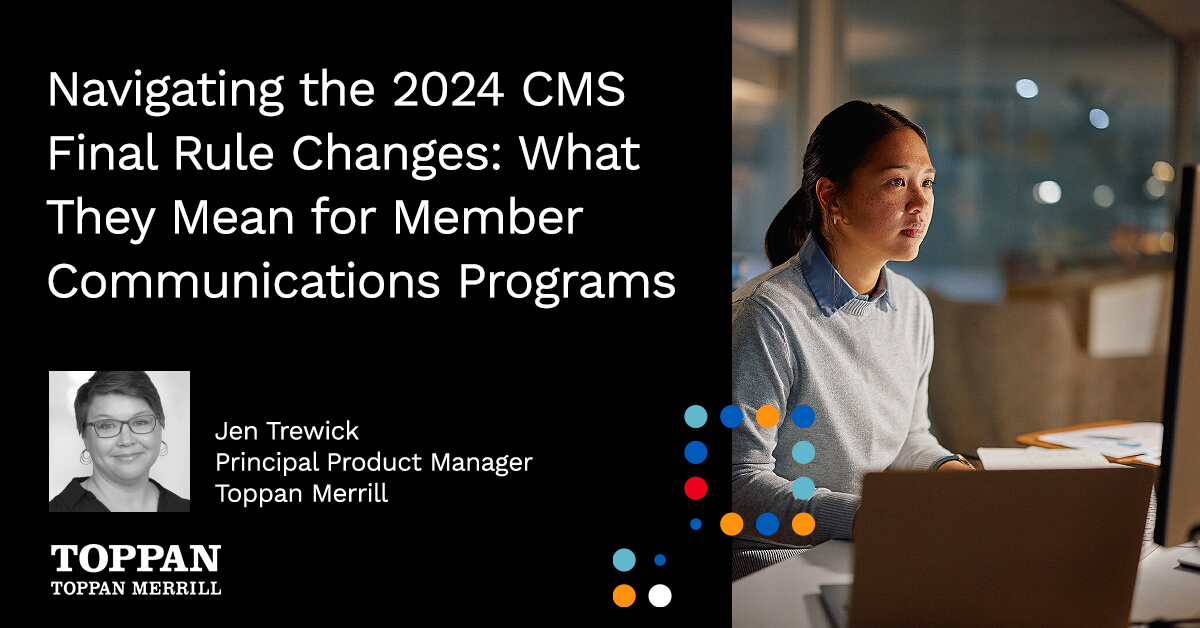CMS is increasing compliance monitoring and oversight for sales, communications and marketing guidelines specific to Medicare-related plans. We see this called out through parts of CMS’ recent Proposed Rule, Advance Notice, and the recently released Medicare Communications and Marketing Guidelines (MCMG).
Specifically, CMS is targeting external sales organizations which contract with health insurance carriers as a marketing arm to sell their plans. Why the sudden spotlight on external sales support, and what can carriers and their external sales agents do, to prepare for potential audits and evaluations by CMS?
Here’s a glimpse at some of the earlier safeguards CMS imposed and later changed, to see where the industry may have veered off course.
Initial warning signs that prompted guidance
Marketing guidelines proved necessary with the unveiling of Medicare Advantage and Part D plans as a new option to traditional Medicare. Several agents’ sales practices walked an unethical line pushing for individuals’ enrollment as a no-holds-barred opportunity. Beneficiaries were sometimes enticed into plans through misleading sales behaviors, and often found themselves with benefits they didn’t understand, not what they expected, or completely losing their medical coverage when the agent didn’t realize a “drug-only” plan would actually disenroll them from their medical plan. Some of the common issues involved:
- Agents switched beneficiaries into a different plan type, when it meant a bigger commission for the agent but resulted in an inferior plan for the individual.
- Provider networks weren’t always checked, before encouraging an enrollee to change plans, sometimes reducing benefits for visiting the same doctors.
- Introducing an option with a lower monthly premium, which in some cases included higher deductibles and out-of-pocket costs without explanation to the enrollee.
Clearly a plan’s external agents needed to learn more about their own suite of carrier options to properly explain and market the new Medicare products. Beneficiary abrasion and the absence of fair marketing practices prompted a need for firm boundaries and disciplines. In stepped CMS.
CMS develops sales and marketing guidelines, conducts surveillance/oversight
CMS issued the first Medicare Marketing Guidelines no later than 2003 to support minimum requirements for promotional and materials content, including what would be either fair and unfair marketing practices and outline accountabilities. But how exactly could improved behaviors be confirmed?
CMS created tools and requirements to provide health plans a means of “checks and balances” to help plans and their contracted agents stay on track which included a “CMS Secret Shopper” program. At one point CMS required health plans to notify CMS of all sales events, which CMS would randomly visit undercover in a “CMS Secret Shopper” mode. CMS developed a performance checklist for scoring sales presentations based on required content, written materials provided, and the agent’s activities. CMS would select an event from those registered by the health plans, and send a representative incognito to evaluate presentation criteria, accuracy of informational materials and agent knowledge. Scores and summaries of findings were posted in a “Surveillance” module online, for plans to investigate and dispute, or accept.
CMS removes the rails on Medicare communications and marketing guidelines
Fast forward to present-day alleviation of requirements: CMS no longer requires sales events to be reported, the online Surveillance Module was quietly terminated after 2013, and CMS has not issued a sales event “CMS Secret Shopper Scorecard” since that time. We’re guessing the shift away from this degree of surveillance was probably a combination of CMS cost-savings, and improved behaviors. But once bumper rails go away, things can end up in the gutter.
CMS also requires plans to contact new members and verify their new plan is what they wanted. This is called an “Outbound Enrollment Verification (OEV).” Previously, CMS required verification via recorded call, allowing a written inquiry after 3 documented failed attempts. However, CMS eased the methodology by only requiring a letter. CMS is pushing the industry to reimplement telephonic confirmations, which begs the question whether issues were found in the OEV follow-through, during audits. Should the thumb have ever been lifted?
Third-party advertising — filing ads with CMS
Another interesting shift in process deals with advertisements from third-party marketers. Previously, CMS embraced the concept of a “generic” advertisement which was thought to reduce risks in misleading marketing if the carriers and plan details were omitted. External agencies would promote themselves as selling certain plan types without having to file the ads with CMS or pass it through the health plan for approval. Now, word on the street combined with what we’re hearing from CMS, is to ensure all external parties file all ads with CMS, which they can now submit to CMS independently versus having to expedite through the health plans they represent. But is this the answer? Perhaps opening the floodgate for any entity to upload ads will result in more documents available to CMS for random audit. But doesn’t this direct line for ad submission between the agencies and CMS kill some of the health plan’s opportunity to preview how they’re represented in the field?
Some time ago, CMS lightened their standard audit protocols for sales and marketing practices. Yes, CMS can still audit those plan operations at any time, however some health plans see lightened oversight as an opportunity to roll the dice and play the odds for not being reviewed. However, stepping out of bounds can increase complaints through beneficiary abrasion, which can impact a plan’s Star Ratings. CMS’ chapters 9 and 21 for running an effective compliance program remind us that regardless of a CMS audit, plans should still maintain regular oversight and monitoring of their external sales agents and brokers.
How Toppan Merrill can help
Toppan Merrill offers several services, including document creation and management, sales enablement, omnichannel communications, printing services, and more. We deliver best-in-class solutions that help you respond quickly to changes in regulations, client needs and markets.
Learn more about how we can help you with mission-critical content by visiting our health plans member communication solutions.



